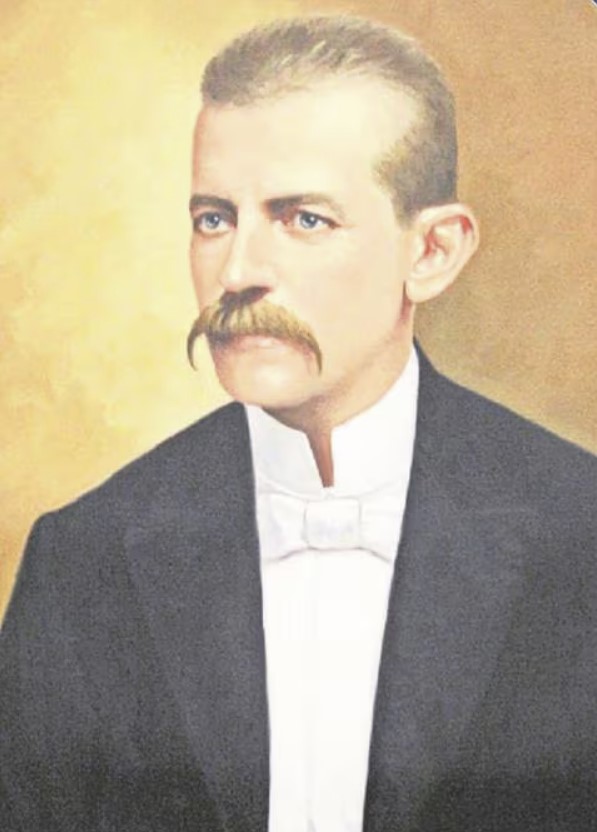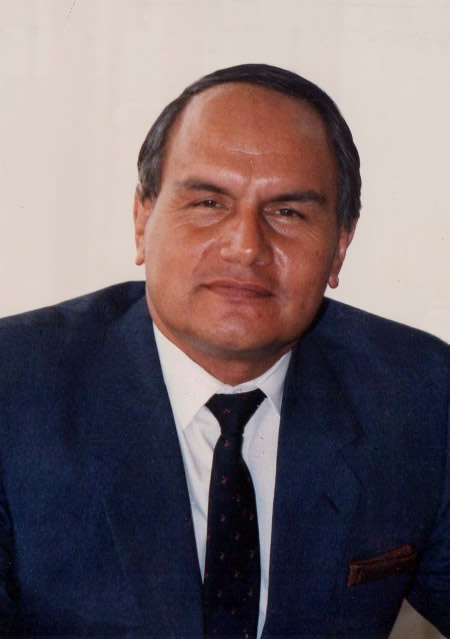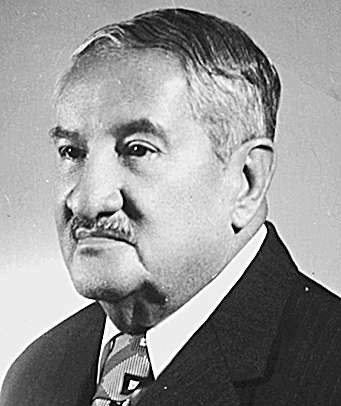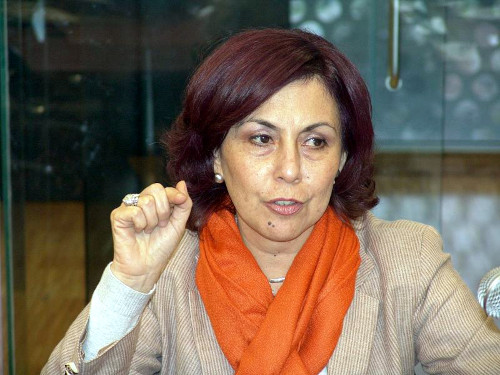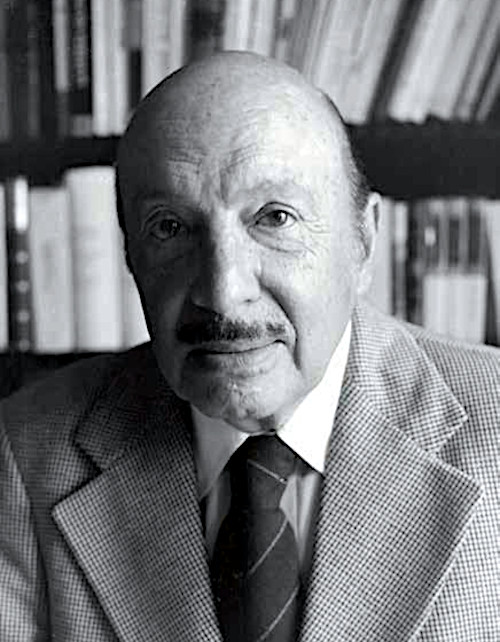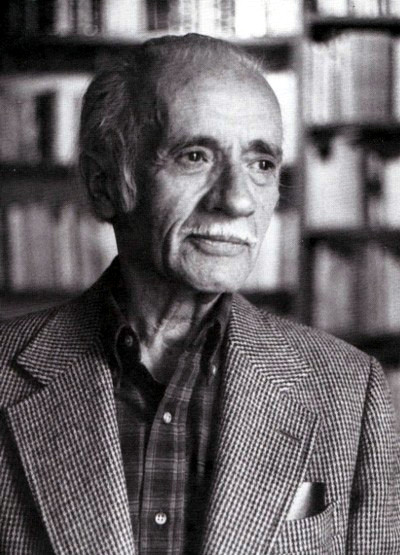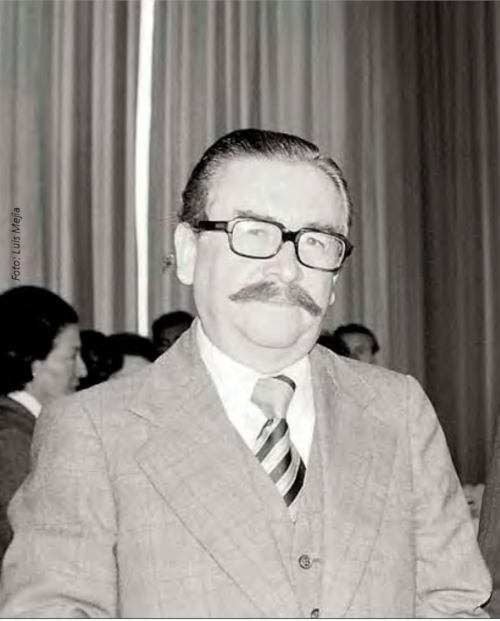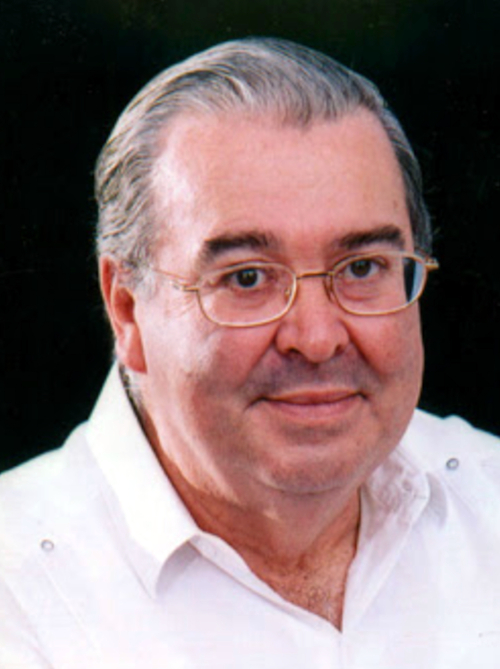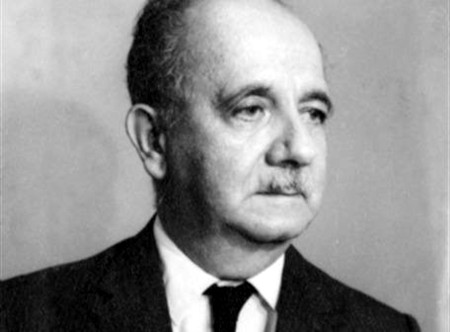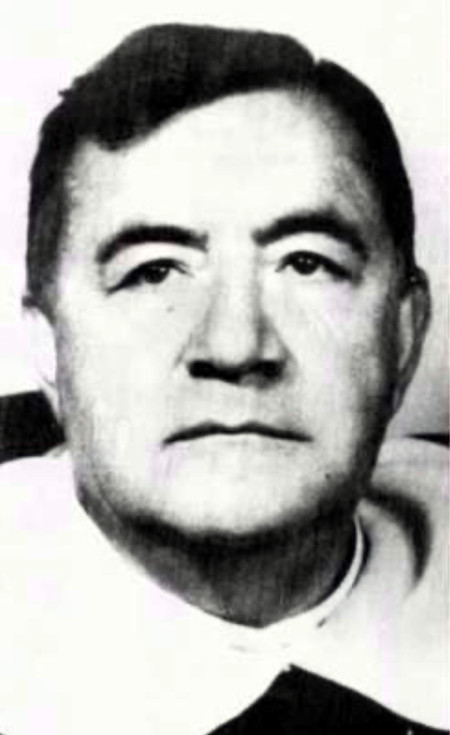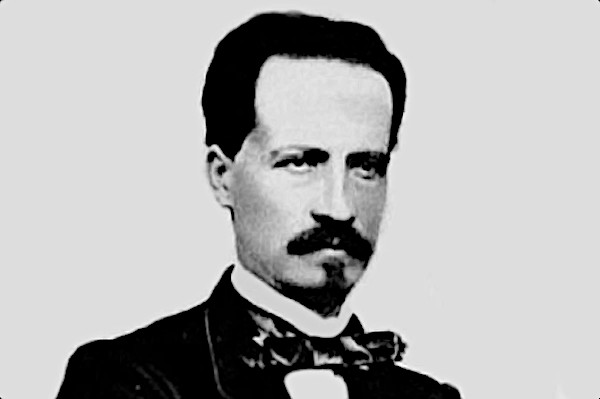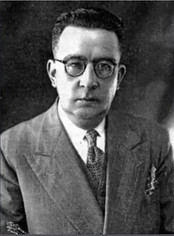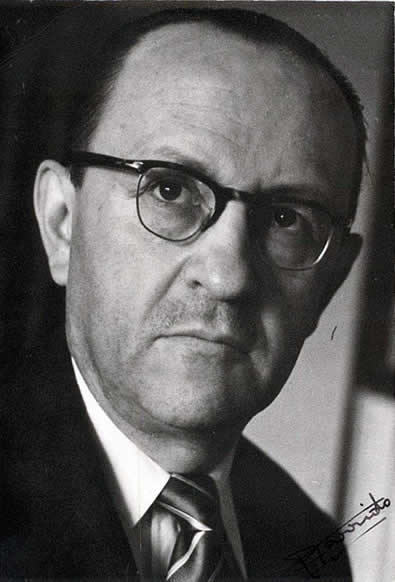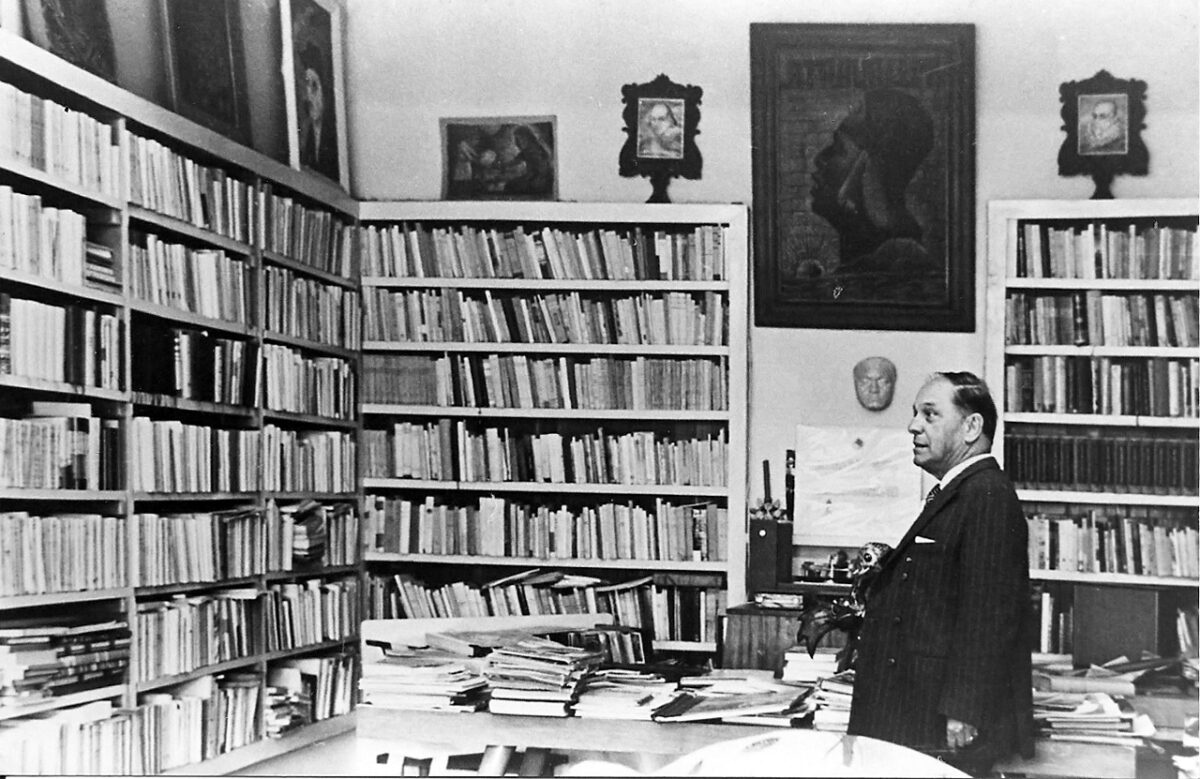Camilo Destruge Illingworth (Guayaquil, October 20, 1863 – Guayaquil, February 26, 1929) was an Ecuadorian historian, journalist, and chronicler. He served as the first director of the Museo Municipal de Guayaquil, where he helped preserve the city’s historical artifacts, and he also directed the Municipal Library for many years. Destruge authored numerous historical works, including La Entrevista de Bolívar y San Martín (1918) and the five-volume Álbum Biográfico Ecuatoriano (1903–1905). He contributed to and edited various newspapers, such as El Telégrafo and La Nación. A member of the National Academy of History, he was also honored by the Venezuelan government with the Orden del Libertador. Declared “Cronista Emérito de la Ciudad” (Honorary Chronicler of the City), Destruge’s legacy is commemorated through a historical institution, a school, and a street named after him in Guayaquil.
Continue reading “Camilo Destruge”Category: Biographers
León Vieira
León Vieira Villafuerte (Baños, October 24, 1940) is an Ecuadorian poet, novelist, biographer, journalist, painter, and teaching professor. He’s lived in Guayaquil for many years where he’s taught at various teaching schools and universities and has directed various magazines. He’s also been the vice rector of the School of Fine Arts in Guayaquil and served as Regional Undersecretary of Education. In 2016, Vieira was decorated with the Juan Montalvo Medal by the city of Ambato for his academic and literary work. His novel El doctor Jehova (1976) was a finalist of the 1972 Seix Barral Award.
Continue reading “León Vieira”Abel Romeo Castillo
Abel Romeo Castillo y Castillo (Guayaquil, January, 22 1904 – Guayaquil, November 11, 1996) was an Ecuadorian writer, historian, biographer, journalist and poet. He was the son of José Abel Castillo Albornoz, the former owner of the newspaper El Telégrafo. Castillo earned a doctoral degree in history in 1931 from the Central University of Madrid, Spain. Among his more notable books are his biographical works on Medardo Ángel Silva, Aurora Estrada i Ayala and José Joaquín de Olmedo, to name a few. His poems “Romance de mi destino” and “Romance criollo de la niña guayaquileña,” were turned into popular pasillo songs. Castillo was one of the founders of the Society of Independent Artists and Writers, and of the Guayas branch of the House of Ecuadorian Culture. Castillo was a member of the Ecuadorian Academies of Language and History.
Continue reading “Abel Romeo Castillo”Tatiana Hidrovo Quiñónez
Tatiana María del Carmen Hidrovo Quiñónez (Portoviejo, 1961) is an Ecuadorian writer, university professor, researcher, historian and politician. She served on Ecuador’s Constituent Assembly from 2007 to 2008, which was tasked with drafting a new constitution.She has published several historical books about Ecuador’s Manabí region, including works on politics, the Catholic church, colonial-era proselytization of indigenous peoples, and more. In Montecristi, Ecuador, she was the president and director of the Ciudad Alfaro Civic Center.
Continue reading “Tatiana Hidrovo Quiñónez”Gustavo Vásconez Hurtado
Gustavo Vásconez Hurtado (Quito, April 3, 1911 – Quito, 1988) was an Ecuadorian novelist, biographer and diplomat. He returned to Ecuador in 1931 after finishing his education in England, France, and Switzerland. He published his first novel, “Vivien Christie,” in 1934, and his second, “Camino de las Landas,” in 1940. His first biography, “Pluma de Acero o La Vida Novelesca de Juan Montalvo,” was published in 1944. He was a member of the Bolivarian Society of Colombia, the Colombian Poetic Center, the Nariñense Academy of History, the Institute of Hispanic Culture, the Literary Legal Academy of Quito, and the House of Ecuadorian Culture. He was also the president of the Ecuadorian Writers Society.
Continue reading “Gustavo Vásconez Hurtado”Alfredo Pareja Diezcanseco
Alfredo Pareja Diezcanseco was an Ecuadorian novelist, essayist, journalist, historian and statesman. He was born in Guayaquil on October 12, 1908 and died in Quito on May 1, 1993. He was part of a literary group called the “Group of Guayaquil,” whose members utilized realism in their stories. The other members of the group were José de la Cuadra, Joaquin Gallegos Lara, Demetrio Aguilera Malta and Enrique Gil Gilbert. Among the many government posts he held throughout his lifetime, he was elected to the Constituent Assembly in 1944 and was made Minister of Foreign Affairs in 1979. In 1979 he was awarded the Eugenio Espejo Award, the most important literary prize in Ecuador.
Continue reading “Alfredo Pareja Diezcanseco”Galo René Pérez
Galo René Pérez (Quito, April 3, 1923 – June 18, 2008) was an Ecuadorian writer, poet, literary critic, biographer, and college professor. He held various posts in literary and cultural institutions of Ecuador. He was Secretary of Public Education during the government of the former President Galo Plaza, and served as Secretary General of the Council of Government. He was also President of the House of Ecuadorian Culture and Director of the Ecuadorian Academy of Language. He published 14 books in his career. His lectures, essays, articles, literary criticism have been collected and published for study abroad. His style, which is simple and elegant, has won him admirers the world over. He was the 2004 recipient of the “Premio Eugenio Espejo” Ecuador’s highest literary award.
Continue reading “Galo René Pérez”Rodolfo Pérez Pimentel
Rodolfo Pérez Pimentel (Guayaquil, November 2, 1939) is an Ecuadorian lawyer, historian, and biographer. He was declared the lifetime chronicler of the city of Guayaquil, and is a member of the National Academy of Ecuadorian History. Pérez Pimentel is the author of the Biographical Dictionary of Ecuador (Diccionario biográfico del Ecuador), which consists of about 1,600 biographies of nationals and foreigners who have been an integral part of Ecuador. In 2005, Pérez Pimentel won the Eugenio Espejo Prize in the literature category for his lifetime work as a biographer. Rodolfo Pérez Pimentel is a highly respected figure in Ecuadorian literary and historical circles, known for his dedication to research, his extensive publications, and his commitment to preserving the cultural heritage of Guayaquil and Ecuador as a whole.
Continue reading “Rodolfo Pérez Pimentel”Jorge Pérez Concha
Jorge Pérez Concha (Guayaquil, June 5, 1908 – Guayaquil, April 1, 1995) was an Ecuadorian historian, biographer, writer, and diplomat. He wrote biographies of Eloy Alfaro, Luis Vargas Torres, and his uncle Carlos Concha Torres, among others. In 1989 Pérez was awarded the Eugenio Espejo Award in Culture by the president of Ecuador.
Continue reading “Jorge Pérez Concha”José María Vargas
Fray José María Vargas Arévalo O.P. (Chordeleg, Azuay, November 9, 1902 – Quito, March 25, 1988) was a distinguished Ecuadorian Dominican friar, historian, and author. Ordained on December 28, 1928, he made significant contributions to historical literature. His works include biographies of the 16th-century South American painter Fray Pedro Bedón and the Spanish Dominican missionary Fray Domingo de Santo Tomás. Vargas was renowned for his in-depth historical accounts of Ecuador, with notable titles like “La Cultura del Quito Colonial,” “La Evangelización en el Ecuador,” and “La Misión Científica de los Geodésicos Franceses en Quito.” His outstanding contributions to Ecuadorian culture were honored in 1984 when he was awarded the prestigious “Premio Eugenio Espejo” in the category of Culture.
Continue reading “José María Vargas”Antonio Borrero y Cortázar
Antonio Borrero y Cortázar, born Antonio María Vicente Narciso Borrero y Cortázar (Cuenca, October 29, 1827 – Quito, October 9, 1911) was an Ecuadorian lawyer, politician, writer, and journalist who served as the President of Ecuador from 1875 to 1876. Known for his commitment to constitutionalism and civil liberties, Borrero was also an influential figure in Ecuadorian literature and journalism. He founded several newspapers, including La República and El Centinela, using them to advocate for political reform and decentralization. His notable literary works include a biography of Fray Vicente Solano and a refutation of a pro-García Moreno biography, reflecting his dedication to both intellectual and political life.
Continue reading “Antonio Borrero y Cortázar”Víctor Manuel Albornoz
Víctor Manuel Albornoz Cabanilla (Lima, March 23, 1896 – Cuenca, October 26, 1975) was an Ecuadorian writer, poet, biographer, and historian.
Alfonso Rumazo González
Alfonso Rumazo González (Latacunga, Ecuador, 1903 — Caracas, Venezuela, 2002) was an Ecuadorian writer, historian, essayist and literary critic. He authored over 30 books in various fields (poetry, fiction, biography, literary criticism). Among his notable works is the biography Manuela saenz, la libertadora del libertador (Quito, 1984), about Doña Manuela Sáenz de Vergara y Aizpuru (1797-1856) who was an Ecuadorian revolutionary heroine of South America who had an intimate relationship with Simon Bolivar around 1822–1830. Rumazo González was nominated for the Nobel Prize in 1999.
Continue reading “Alfonso Rumazo González”Benjamín Carrión
Benjamín Carrión Mora (Loja, April 20, 1897 – Quito, March 8, 1979) was one of the great Latin American intellectuals of the 20th century. He was a lawyer, writer, novelist, poet, essayist, biographer, literary critic, legislator, diplomat, educator and cultural promoter. His most notable literary work is Atahualpa (1934), a biography written in story form about the last Inca emperor, which has been translated into English and French. In 1944 Carrión founded the House of Ecuadorian Culture, which preserves and promotes many aspects of Ecuador’s culture, including music, dance, art, literature, theater and film. Considered Carrión’s greatest achievement and legacy, this organization maintains several museums, libraries and performance venues throughout Ecuador, as well as a printing press which has been instrumental in publishing many noteworthy Ecuadorian authors.
Continue reading “Benjamín Carrión”
